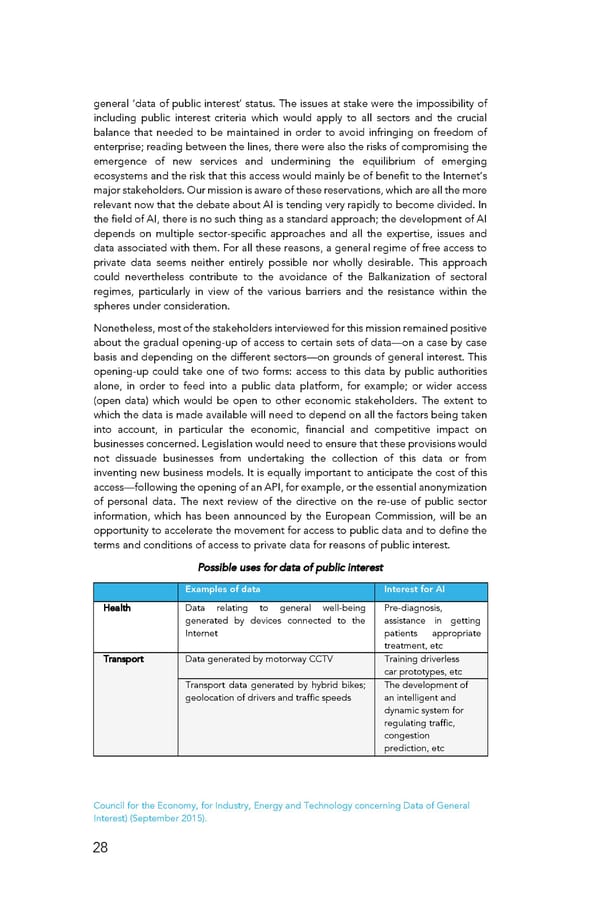general ‘data of public interest’ status. The issues at stake were the impossibility of including public interest criteria which would apply to all sectors and the crucial balance that needed to be maintained in order to avoid infringing on freedom of enterprise; reading between the lines, there were also the risks of compromising the emergence of new services and undermining the equilibrium of emerging ecosystems and the risk that this access would mainly be of benefit to the Internet’s major stakeholders. Our mission is aware of these reservations, which are all the more relevant now that the debate about AI is tending very rapidly to become divided. In the field of AI, there is no such thing as a standard approach; the development of AI depends on multiple sector-specific approaches and all the expertise, issues and data associated with them. For all these reasons, a general regime of free access to private data seems neither entirely possible nor wholly desirable. This approach could nevertheless contribute to the avoidance of the Balkanization of sectoral regimes, particularly in view of the various barriers and the resistance within the spheres under consideration. Nonetheless, most of the stakeholders interviewed for this mission remained positive about the gradual opening-up of access to certain sets of data—on a case by case basis and depending on the different sectors—on grounds of general interest. This opening-up could take one of two forms: access to this data by public authorities alone, in order to feed into a public data platform, for example; or wider access (open data) which would be open to other economic stakeholders. The extent to which the data is made available will need to depend on all the factors being taken into account, in particular the economic, financial and competitive impact on businesses concerned. Legislation would need to ensure that these provisions would not dissuade businesses from undertaking the collection of this data or from inventing new business models. It is equally important to anticipate the cost of this access—following the opening of an API, for example, or the essential anonymization of personal data. The next review of the directive on the re-use of public sector information, which has been announced by the European Commission, will be an opportunity to accelerate the movement for access to public data and to define the terms and conditions of access to private data for reasons of public interest. Possible uses for data of public interest Examples of data Interest for AI Health Data relating to general well-being Pre-diagnosis, generated by devices connected to the assistance in getting Internet patients appropriate treatment, etc Transport Data generated by motorway CCTV Training driverless car prototypes, etc Transport data generated by hybrid bikes; The development of geolocation of drivers and traffic speeds an intelligent and dynamic system for regulating traffic, congestion prediction, etc Council for the Economy, for Industry, Energy and Technology concerning Data of General Interest) (September 2015). 28
 For a Meaningful AI - Report Page 28 Page 30
For a Meaningful AI - Report Page 28 Page 30